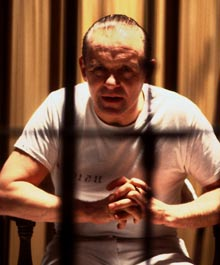

“You can’t reduce me to a set of influences. You’ve given up good and evil for behaviorism, Officer Starling. You’ve got everybody in moral dignity pants—nothing is ever anybody’s fault. Look at me…can you stand to say I’m evil?
The phenomenon that is Hannibal Lecter is unmatched in the history of Hollywood. Never has an evil but clearly mortal character ever been so popular. Hannibal (2001) set box office records for a non-holiday weekend release, and it was one of the few live action films to do over $200 million in domestic gross. A remake of Red Dragon is coming out soon, one that reportedly gives Lecter a much bigger role than he had in the original Thomas Harris novel. Sales of the new DVD version of Manhunter (1986) are brisk (unlike its original box office take), and (as I write) a Criterion edition of The Silence of the Lambs (1991) has come out in tandem with the much heralded video release of Hannibal.
How has such a character enthralled the world? What makes Lecter’s brand of evil so palatable and attractive? Lecter is transformed from a ruthless serial killer into a beloved protagonist by the third entry in the series. This essay will examine all three Lecter films (and the novels on which they are based), seeking to explain our great fascination with Hannibal the Cannibal in terms of the almost preternatural power he exerts over everyone with whom he comes in contact.

Previously, and at greater length than is possible here, I have proposed a catharsis theory of horror-pleasure that focuses on the vicarious feelings of power that horror films provide their audiences. Influenced as I am by Friedrich Nietzsche’s philosophy of the Will to Power, I believe that much of our pleasure in horror films comes from our dual identification with both the threatening antagonists and human protagonists in such works. The astounding feats of the monster or human psychotic are what most attracts us to them, for they exhibit powers and abilities far beyond those of mortal men. It is precisely for this reason that we revel in their penchant for wreaking immeasurable havoc. Sharing in their superhuman acts, we are exhilarated and alarmed by our enjoyment of the forbidden. Our ambivalence is grounded in this tension between our guilty enjoyment of such power and the true terror we would feel if it were us that were being victimized, as well as this dual identification with both the monstrous force and with those who seek to conquer it.
In my view, then, a battle for mastery between human and monster is at the heart of most horror narratives. Following Nietzsche, I will highlight three senses of power in my account of horror-pleasure: power over the self, over the environment and over one’s inferiors. Wresting control in these major areas of our lives is essential to human happiness, which Nietzsche thought of as resulting from a feeling of increasing power. That feeling is most intense when great resistance is overcome. My major thesis is that Hannibal Lecter is one of the most powerful human characters in the history of horror and that is the primary reason why we are so drawn to him. This essay will analyze the evolving role of Lecter in the trilogy of novels and movies, where he develops from an interesting sidelight into almost the sole narrative and emotional focus.